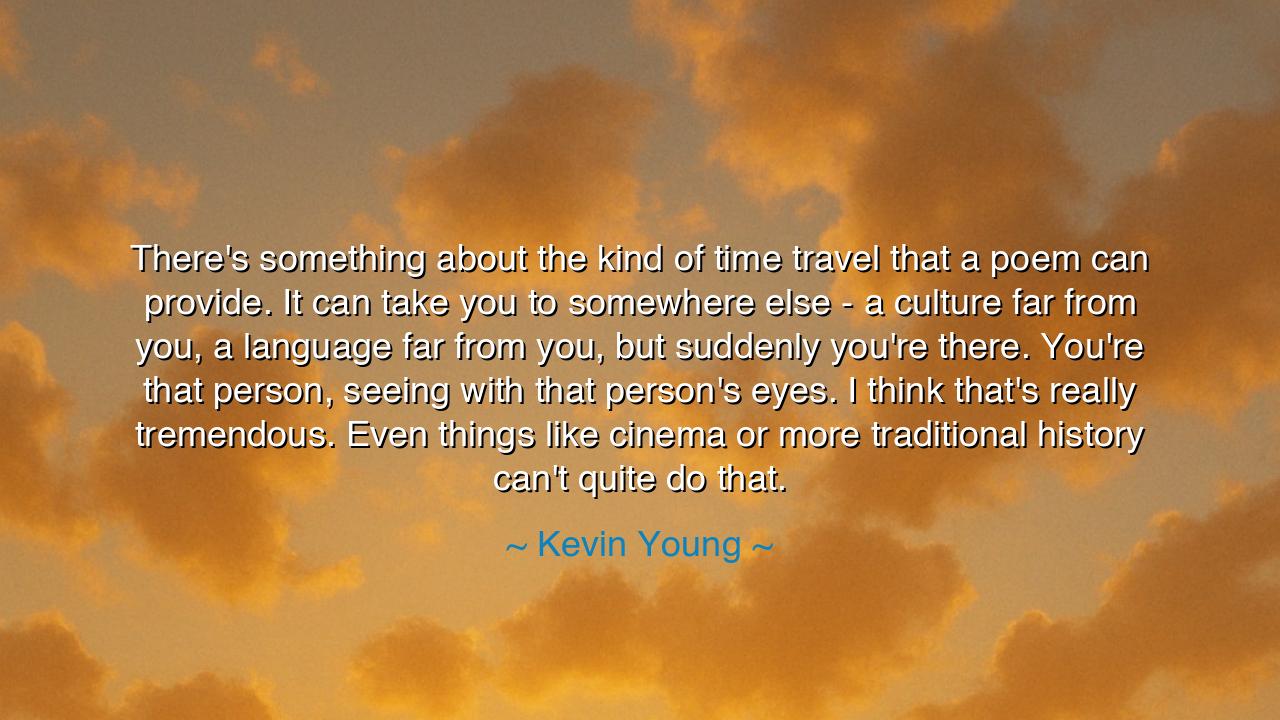
There's something about the kind of time travel that a poem can
There's something about the kind of time travel that a poem can provide. It can take you to somewhere else - a culture far from you, a language far from you, but suddenly you're there. You're that person, seeing with that person's eyes. I think that's really tremendous. Even things like cinema or more traditional history can't quite do that.






In the words of Kevin Young, poet, scholar, and guardian of memory, there lives a truth both tender and eternal: “There’s something about the kind of time travel that a poem can provide. It can take you to somewhere else — a culture far from you, a language far from you, but suddenly you’re there. You’re that person, seeing with that person’s eyes. I think that’s really tremendous. Even things like cinema or more traditional history can’t quite do that.” These words unveil the quiet miracle of poetry — that in a handful of lines, it can bridge centuries, languages, and souls. It does not merely recount history; it inhabits it. Through rhythm and image, poetry transcends time itself, allowing us to dwell, if only for a moment, within another’s heart.
The origin of this insight flows from Young’s lifelong devotion to verse as both art and archive. As the director of the Smithsonian’s National Museum of African American History and Culture, and as a poet steeped in the voices of the past, he has witnessed how words can resurrect what history forgets. Where documents and monuments record the facts, poetry preserves the feelings — the breath of a people, the music of their speech, the fire of their longing. Young’s words remind us that poetry is not bound to chronology; it is a vessel of empathy, capable of carrying us across time and space to experience what others once knew, feared, or loved.
For truly, when one reads a poem — whether by Homer, Li Bai, or Langston Hughes — one does not stand outside, observing. One steps inside. The rhythm of the poem becomes the rhythm of one’s own pulse; the poet’s vision becomes the reader’s sight. Through metaphor and language, poetry achieves what no other medium can: it dissolves the boundary between past and present, self and other. Where cinema dazzles the eye and history teaches the mind, poetry touches the soul. It is time travel of the most intimate kind — not of the body, but of consciousness.
Consider the poem “The Seafarer,” written by an anonymous Anglo-Saxon over a thousand years ago. In its stark lines, the speaker laments the cold of the northern sea, the loneliness of exile, the yearning for purpose. Though centuries have passed, the reader today can still feel the sting of that icy wind, the ache of isolation, the pull of fate. No historian can recreate that emotion; no painting can make us feel the salt on our skin. Yet through the poet’s words, time collapses, and the ancient mariner’s solitude becomes our own. This is the magic of poetry — that it turns remembrance into resurrection.
In every culture, the poet has been the keeper of humanity’s memory. Before history was written, before stories were bound in ink, poets carried the knowledge of tribes in song and verse. They were the first time travelers — crossing generations through the power of rhythm. From the griots of West Africa who sang the lineages of kings, to the bards of Greece who told of heroes and gods, their poems preserved not only events but essence — the heartbeat of their people. Kevin Young, heir to this ancient tradition, reminds us that poetry is not just art; it is a portal, one that connects us to the continuum of human experience.
And yet, his reflection carries another truth: that poetry demands presence. Unlike cinema or history, which unfold before the passive spectator, a poem requires the reader’s soulful participation. You must enter it, breathe its rhythm, dwell in its silence. Only then does it open its doors to time travel. In this way, poetry becomes both journey and mirror — revealing not only the past but also yourself, reflected in the emotions of another. The empathy it awakens is the antidote to indifference, the bridge across the vast distances of culture and age.
Therefore, my listener, take this lesson from Kevin Young’s wisdom: read poetry not as entertainment, but as communion. Let its words be the vessel by which you cross into other worlds. Read the verses of those who came before you — those whose names were lost, whose languages were nearly silenced — and feel within them the pulse of your shared humanity. Do not hurry through the poem; let it transform you. For each line is a doorway, and each image a thread woven into the great tapestry of being.
And remember this above all: history informs, but poetry unites. History tells you what happened; poetry lets you live it. When you read a poem, you become a traveler through centuries, a witness to the unseen, a participant in the eternal conversation of the human spirit. So open the page as you would open a gate to another realm, and walk through — for as Kevin Young teaches, the greatest journey you will ever take may begin not in a machine, but in a single, timeless line of verse.






AAdministratorAdministrator
Welcome, honored guests. Please leave a comment, we will respond soon